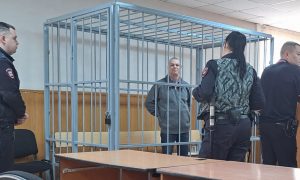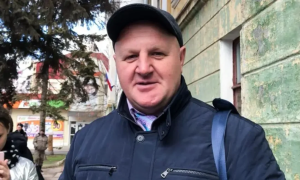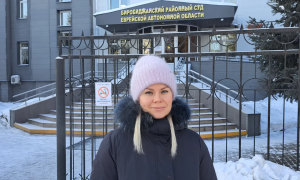Kazakhstan’s KNB secret police has arrested two Jehovah’s Witnesses for discussing their faith with KNB informers. Teymur Akhmedov and Asaf Guliyev are in two months’ pre-trial detention, although Akhmedov needs hospitalisation for cancer treatment. The Judge claimed this was to defend a “civilised society”.
On 18 January Kazakhstan’s National Security Committee (KNB) secret police arrested two Jehovah’s Witnesses in the capital Astana, for discussing their faith with young people recruited as KNB informers. A court ordered Teymur Akhmedov and Asaf Guliyev to be held in pre-trial detention for two months, although Akhmedov is suffering from cancer and needs hospitalisation.
The Jehovah’s Witnesses appear, as in other cases involving Muslim and Protestant prisoners of conscience, to have been set up for prosecution by the KNB using informers it recruited. These informers invited the Witnesses to meetings the KNB recorded (see below).
Judge Akmaral Isayeva claimed that the Jehovah’s Witnesses’ “crime presents a danger to the public in that it violates a fundamental constitutional principle, the principle of equality”. She goes on to claim that “observance of this principle is one of most important conditions for the existence and development of any civilised society” (see below).
The Judge was presented with a report from the National Scientific Center for Oncology and Transplantation (the national cancer centre) which “recommends an operation and requests that Akhmedov undergo an examination before being hospitalised”. His lawyer argued that he should therefore held in house arrest to enable treatment. But the Judge refused this, violating the UN Standard Minimum Rules for the Treatment of Prisoners (known as the Mandela Rules), claiming that the “report is a recommendation”. The Judge has been repeatedly unavailable for questions, so Forum 18 has been unable to ask her how her decision demonstrated that Kazakhstan was a “civilised society” (see below).
At least two Muslims, Kuanysh Bashpayev from Pavlodar and Satimzhan Azatov from Astana, are also in pre-trial detention facing similar accusations (see forthcoming F18News article).
Adventist prisoner of conscience Yklas Kabduakasov has tried to appeal against his imprisonment to the Supreme Court, but this has been refused. Fellow-Christians state that “Yklas conveys his greetings to all who are praying for him .. these letters are a great support to him” (see below).
Criminal charges
All four men are facing charges under Criminal Code Article 174 (“Incitement of social, national, clan, racial, or religious hatred or discord, insult to the national honour and dignity or religious feelings of citizens, as well as propaganda of exclusivity, superiority or inferiority of citizens on grounds of their religion, class, national, generic or racial identity, committed publicly or with the use of mass media or information and communication networks, as well as by production or distribution of literature or other information media, promoting social, national, clan, racial, or religious hatred or discord”).
Part 2, which the two Jehovah’s Witnesses Akhmedov and Guliyev are charged under, punishes these actions “committed by a group of persons, a group with prior planning, repeatedly, with violence or threat of violence, or by an official, or by the leader of a public association”. If convicted they face five to 10 years imprisonment, “with deprivation of the right to hold specified positions or to engage in specified activity for up to three years”.
Part 1, which the two Muslims Bashpayev and Azatov are charged under, punishes these actions committed by individuals. If convicted, they face two to seven years imprisonment, or two to seven years restricted freedom. Typically, during sentences of restricted freedom individuals live at home, but are not able to leave their town or city without seeking permission. They are often also banned from visiting restaurants, cafes or places of public entertainment.
If convicted, the Muslims and Jehovah’s Witnesses are likely to be added to the Finance Ministry Financial Monitoring Committee List of individuals “connected with the financing of terrorism or extremism”. All known prisoners of conscience convicted under Article 174 have been added to this List, thus freezing any bank accounts they may have, without any additional due legal process. As the government does not state who is on the List, people normally find out they have been added when they or relatives attempt to withdraw money from their account (see F18News 10 June 2016Â http://www.forum18.org/archive.php?article_id=2187).
Human rights defenders’ criticise Article 174
Article 174 has been strongly criticised by the United Nations (UN) Special Rapporteur on the rights to Freedom of Peaceful Assembly and of Association, Maina Kiai. He stated that Articles such as this “pose serious risks of criminalizing and penalizing legitimate activities of associations”. “The Code does not strictly define what is meant by ‘incitement of discord’, which may leave the term open for arbitrary interpretation,” he warned in his 16 June 2015 report following his January visit to Kazakhstan (A/HRC/29/25/Add.2) (see F18News 9 November 2015Â http://www.forum18.org/archive.php?article_id=2119). During the visit he noted stated intimidation of those he met and commented on officials’ “general unwillingness to properly protect human rights” (see F18News 25 February 2015Â http://www.forum18.org/archive.php?article_id=2043).
Kazakh human rights defenders have repeatedly called for Criminal Code Article 174 to be reworded or abolished. “We have more than once criticised it [Article 174] because it does not contain a precise and clear formulation of what constitutes social, national or other hatred,” Yevgeny Zhovtis of the Kazakhstan International Bureau for Human Rights and the Rule of Law told a press conference in Almaty in January 2016. Twelve Kazakh human rights organisations, including Adil Soz and the Kazakhstan International Bureau for Human Rights and the Rule of Law, strongly criticised the government’s human rights record to the UN Human Rights Committee (see F18News 8 June 2016Â http://www.forum18.org/archive.php?article_id=2186).
In June 2016 the UN Human Rights Committee expressed concern about “the broad formulation of the concepts of ‘extremism’, ‘inciting social or class hatred’ and ‘religious hatred or enmity’ under the State party’s criminal legislation and the use of such legislation on extremism to unduly restrict freedoms of religion, expression, assembly and association (see F18News 22 July 2016Â http://www.forum18.org/archive.php?article_id=2201).
Informers, secret surveillance
The two Jehovah’s Witnesses are 60-year old Teymur Akhmedov and 43-year old Asaf Guliyev. Teymur Sultan ogly Akhmedov (born 7 May 1956) is married with three sons, and suffers from cancer (see below). Asaf Gadzhiaga ogly Guliyev (born 4 October 1973), who is also married, is a citizen of Azerbaijan but long resident in Kazakhstan.
In the indictment of the two Jehovah’s Witnesses, seen by Forum 18, Major Medet Duskaziyev of Astana KNB secret police gives short accounts of what he claims were conversations Akhmedov and Guliyev had about their faith with others in 2016. The conversations were in private homes of city residents, and Major Duskaziyev claims that the two men “spoke negatively about representatives of the religions of Islam and Orthodoxy” and “advocated the exclusivity and superiority of one religion over another”.
In Major Duskaziyev’s view this constituted violations of Criminal Code Article 174, Part 2. “Akhmedov committed a grave crime against public order and security,” he claimed.
Jehovah’s Witnesses described Akhmedov and Guliyev as “victims of a fabricated case.” They told Forum 18 on 31 January that the two men were invited to the rented flats of several adult males, who claimed to be university students interested in the beliefs of Jehovah’s Witnesses. Akhmedov and Guliyev met the young men for discussions on various dates in 2016.
“Unbeknown to Akhmedov and Guliyev the ‘students’ covertly recorded the discussions using a high quality video camera,” Jehovah’s Witnesses told Forum 18. All the approximately 16 religious discussions “were secretly video recorded”.
During those discussions, the “students” asked Akhmedov and Guliyev “provocative questions about Islam and the Russian Orthodox Church”. Jehovah’s Witnesses insist that despite Major Duskaziyev’s claims, their discussions “were entirely peaceful”.
Asked about the case on 27 January, Astana KNB told Forum 18 that Major Duskaziyev was “not available,” and referred it his superior, Lieutenant Colonel Daniyar Tajigulov, Deputy Head of the Investigations Division. Asked why the KNB was doing this, he replied “I cannot discuss this with you over the phone.”
“Operational/investigative measures”
The government seems to often use the KNB secret police to set people up to exercise their internationally recognised right to freedom of religion and belief, and then jail them for exercising their freedom. The KNB is routinely in the lead in such prosecutions, describing the spies and informers it uses as carrying out “operational/investigative measures”.
The KNB-led investigations and prosecutions rely on the regime having banned many aspects of the right to freedom of religion and belief. This includes banning exercising this freedom by people without state permission, banning sharing beliefs without state permission, and banning religious publications that have not passed state censorship (see Forum 18’s Kazakhstan religious freedom survey http://forum18.org/archive.php?article_id=1939).
Seventh-day Adventist prisoner of conscience Yklas Kabduakasov was in December 2015 sentenced to two years in a labour camp, for discussing his faith with students recruited by the KNB secret police in a KNB-rented flat (see F18News 29 December 2015Â http://www.forum18.org/archive.php?article_id=2136). In June 2016 Muslim Rustam Musayev was imprisoned for two years in a labour camp for talking to possible KNB officers about his Islamic faith. The KNB recorded the discussions and they may have set up the meetings (see F18News 10 November 2016Â http://www.forum18.org/archive.php?article_id=2229). Both were, like the two Jehovah’s Witnesses currently in pre-trial detention, charged under Criminal Code Article 174, Part 1.
Forum 18 spoke to one KNB spy, Sanat Aktenberdy, used to infiltrate and find evidence to jail members of the Tabligh Jamaat Islamic missionary movement. He refused to explain to Forum 18 what if any wrongdoing he might have found, or what exactly the alleged “extremist activity” of the movement is (see F18News 22 April 2016Â http://www.forum18.org/archive.php?article_id=2170).
Alleged members of Tabligh Jammat continue to be jailed with the KNB being in the lead of prosecutions. Two – Saken Tulbayev and Khalambakhi Khalym – were convicted and imprisoned under Criminal Code Article 174, Part 1. Like the other 44 alleged members of Tabligh Jamaat prosecuted since December 2014, they were also sentenced under Criminal Code Article 405. This punishes involvement in a “banned movement” (see F18News 9 January 2017Â http://www.forum18.org/archive.php?article_id=2245).
Warning letters
On 14 January Almazbek Mambetov, of Astana Administration’s Religious Affairs Department, sent Akhmedov and Guliyev warning letters. The texts, seen by Forum 18, are identical and state that the Religious Affairs Department “warns you of the following in connection with a complaint (..) received from citizen of the Republic of Kazakhstan A. A. Rakhymzhanov, born 10 November 1997.” According to Rakhymzhanov’s alleged complaint, the Jehovah’s Witnesses “tried to persuade him that it was the only true religion” and “coerced him to adopt their faith.”
“It is prohibited for religious associations to forcibly involve citizens of Kazakhstan, foreigners and stateless persons in their activity,” Mambetov states. He stresses that prior official permission is required for “missionary” activity (see Forum 18’s Kazakhstan religious freedom survey http://forum18.org/archive.php?article_id=1939). In conclusion he warns them to “obey the Laws of the Republic of Kazakhstan in relation to religion”.
Arrest, pre-trial detention
KNB secret police officers arrested Akhmedov and Guliyev in Astana on 18 January. On 19 January the KNB charged the two men under Criminal Code Article 174, Part 2 and Major Duskaziyev requested that they be held in two months’ pre-trial detention. On 20 January Judge Akmaral Isayeva of Saryarka District Court No. 2, in separate hearings for the two men approved this.
“Danger to the public”, “civilised society”?
Judge Isayeva in her decision argues that Akhmedov is “suspected of committing a grave criminal offence”. She claims that “this crime presents a danger to the public in that it violates a fundamental constitutional principle, the principle of equality”. She goes on to claim that “observance of this principle is one of most important conditions for the existence and development of any civilised society.”
The Judge added that the “object against which the crime was committed is the principle of international law and the constitutional principle that the incitement of of social, national, clan, racial, or religious hatred or discord must not be allowed.”
Jehovah’s Witnesses state that in court they raised the freedoms enshrined in the International Covenant of Civil and Political Rights, which Kazakhstan has a solemn international obligation to implement, and the UN Human Rights Committee’s criticisms. But these points were ignored.
Detaining not hospitalising a cancer sufferer
Judge Isayeva notes in her decision that Akhmedov’s lawyer “made a motion for preventive measures in the form of house arrest to be imposed because her client suffers from cancer.” A report from the National Scientific Center for Oncology and Transplantation (the national cancer centre) was submitted to the court, which “recommends an operation and requests that Akhmedov undergo an examination before being hospitalised.”
Judge Isayeva argues that the “report is a recommendation,” but that the “defence did not submit any documents proving that it was impossible for the suspect to be in detention due to his illness.” Therefore, the “court denies the defence lawyer’s motion to impose preventive measures in the form of house arrest.”.
The Judge’s decision violates the UN Standard Minimum Rules for the Treatment of Prisoners (known as the Mandela Rules, A/C.3/70/L.3), which also apply to people in pre-trial detention. Rule 27 states in part: “Prisoners who require specialized treatment or surgery shall be transferred to specialized institutions or to civil hospitals .. Clinical decisions may only be taken by the responsible health-care professionals and may not be overruled or ignored by non-medical prison staff” (see http://www.unodc.org/documents/justice-and-prison-reform/GA-RESOLUTION/E_ebook.pdf).
Judge Isayeva went on to claim that “considering that Akhmedov is suspected of committing a grave criminal offence (..), the court has grounds to believe that if he is left at large, he could hide from the pre-trial investigation agency and the court, obstruct an objective investigation of the case, and continue to engage in criminal activity. Therefore the court finds no grounds for denying the investigator’s motion and imposes preventive measures on Akhmedov in the form of detention.”
Between 25 and 27 January Saryarka District Court No. 2 officials, including Judge Isayeva, were repeatedly claimed to be “busy” and not available to answer questions.
So Forum 18 was unable to ask Judge Isayeva to explain how putting two men entrapped by the KNB into detention, one of whom has cancer and a medical recommendation for hospitalisation, demonstrated that Kazakhstan was a “civilised society”.
What “grave crime against public order and security”?
Kanat Tileuzhan of Saryarka District Prosecutor’s Office, who is leading the prosecution in the case, told Forum 18 on 26 January that the initiative to put prisoners of conscience Akhmedov and Guliyev in custody was “not my own decision but our whole leadership supported it.”
Told that Jehovah’s Witnesses think that that the case is fabricated by the KNB, and asked what exactly the alleged “grave crime against public order and security” was, Prosecutor Tileuzhan replied: “I am not competent to talk to you over the phone.”
On 30 January, Judge Eleonora Ungarsynova of the Judicial Chamber for Criminal Cases of the Astana City Court in separate hearings rejected Akhmedov and Guliyev’s appeal against the pre-trial detention (see below).
Held at Astana Investigation Prison
Prisoners of conscience Akhmedov and Guliyev are being held in Astana’s Investigation Prison No. 12. Major Majidov (who would not give his first name) of the prison claimed to Forum 18 on 24 that “they are doing fine.” “They have food and all they need.”
Asked whether they can read their Bibles and pray, Majidov did not answer. “I cannot discuss this over the phone,” he told Forum 18. He then declined to talk further, asking for any questions to be sent in writing.
The UN Standard Minimum Rules for the Treatment of Prisoners (known as the Mandela Rules, A/C.3/70/L.3) require governments to respect the freedom of religion or belief and other human rights of prisoners. Muslim prisoners of conscience have stated that their human rights are violated in prison, including by being banned from reading the Koran and other religious books (see eg. F18News 9 March 2016Â http://www.forum18.org/archive.php?article_id=2156). Akhmedov and Guliyev’s prison address is:
010000 Astana
Alash Tas Zhol street 30/1
SI-12 (ETs 166/1)
Kazakhstan
Supreme Court refuses to hear challenge
Adventist prisoner of conscience Kabduakasov tried to appeal against his imprisonment to the Supreme Court in Astana. However, in November 2016 the Supreme Court refused to accept the appeal. The Court “did not give any explanation for its decision to the lawyer,” Kabduakasov’s fellow-Christians told Forum 18 on 23 January. He was in December 2015 sentenced to two years in a labour camp, for discussing his faith with students recruited by the KNB secret police in a KNB-rented flat (see F18News 29 December 2015Â http://www.forum18.org/archive.php?article_id=2136).
Prisoner of conscience Kabduakasov is serving his two-year prison sentence in the northern city of Pavlodar. “Nothing has changed with Yklas yet,” fellow-Christians stated. “He was refused the right to be released on parole.” They added that “Yklas conveys his greetings to all who are praying for him. He said that he receives up to 150 letters from around the world every day, and that these letters are a great support to him.” His prison address is:
140000 g. Pavlodar
Severnaya promyshlennaya zona
Uchr. AP-162/3, 4 otryad
Kabduakasovu Yklasu Kairullinovichu
Kazakhstan
Muslim prisoner of conscience Tulbayev is also in the same prison. On 2 July 2015 he was sentenced to four years eight months’ imprisonment. He was also banned from exercising freedom of religion or belief, including praying with others and reading the Koran, until the end of 2022 three years after his release (see F18News 8 July 2015Â http://www.forum18.org/archive.php?article_id=2078). His prison address is:
140000 g. Pavlodar
Severnaya promyshlennaya zona
Uchr. AP-162/3
Tulbayevu Sakenu Peisenovichu
Kazakhstan
http://www.forum18.org/archive.php?article_id=2252Â





